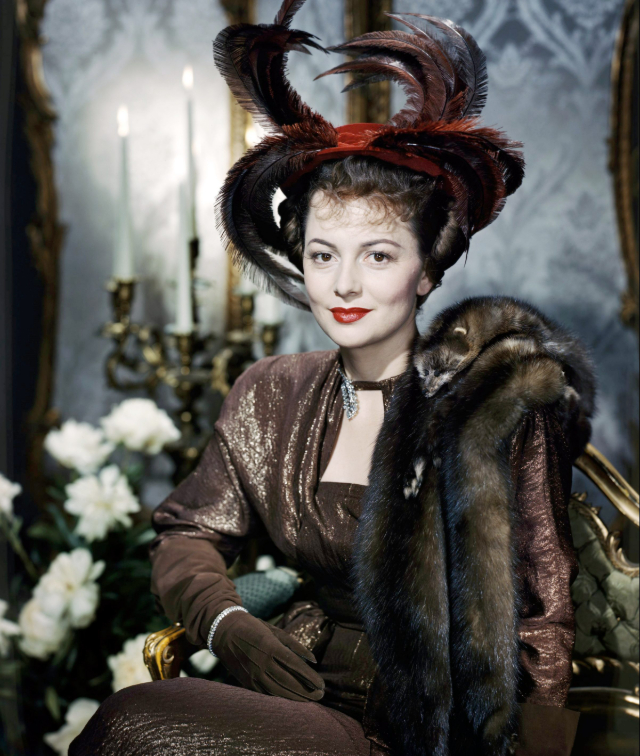Olivia de Havilland (1916–2020) was not only a luminous presence on the silver screen but also a trailblazer who changed the course of Hollywood history. With a career spanning more than 50 years, she left behind a legacy of artistic excellence, quiet strength, and defiance against an unfair studio system.

A Transcontinental Beginning
Born on July 1, 1916, in Tokyo, Japan, Olivia Mary de Havilland came into the world far from the Hollywood glamour she would one day embody. She was the daughter of British parents and the older sister of fellow actress Joan Fontaine. Though both sisters would go on to win Academy Awards, their relationship was famously strained—a rivalry that fascinated fans and tabloids for decades.
Shortly after her birth, Olivia’s family relocated to California, where her early love of drama blossomed. By her teenage years, she was performing in school plays, and a role in a local production of A Midsummer Night’s Dream caught the attention of legendary theatre director Max Reinhardt. This led to her appearance in the 1935 film adaptation of the Shakespearean comedy, marking her official screen debut and launching a career that would help define the Golden Age of Hollywood.

Stardom at Warner Bros. and a Legendary On-Screen Pairing
Olivia’s ascent to fame was swift. Signed by Warner Bros., she quickly became a leading lady in a series of successful films. Audiences adored her chemistry with Errol Flynn, her frequent co-star in eight films including Captain Blood (1935), The Charge of the Light Brigade (1936), and The Adventures of Robin Hood (1938). Their swashbuckling adventures captured the imagination of a generation and solidified de Havilland’s place in Hollywood’s pantheon of stars.
But it was her performance as Melanie Hamilton Wilkes in Victor Fleming’s epic Gone with the Wind (1939) that elevated her to a new level of acclaim. Her portrayal of the gentle Southern belle earned her an Academy Award nomination for Best Supporting Actress and made her a household name.

Taking on the Studio System
Despite her growing stardom, de Havilland became increasingly frustrated with the limited, often passive roles she was offered. Determined to expand her range and gain more artistic control, she made a bold move: in 1943, she sued Warner Bros. over the legality of contract extensions imposed by the studio.
Her victory in 1945—now known as the “de Havilland Decision”—was a landmark case in entertainment law. It prevented studios from indefinitely extending actors’ contracts through suspensions and gave performers far more freedom in their careers. The ruling reshaped the Hollywood studio system and empowered countless actors to make their own creative choices.

A Career Reborn
Following her legal triumph, de Havilland began accepting more complex and emotionally rich roles. Her performance as an unwed mother in To Each His Own (1946) earned her the Academy Award for Best Actress. She won a second Oscar for her role in The Heiress (1949), where she played a painfully shy and manipulated heiress who undergoes a stunning emotional transformation.
In The Snake Pit (1948), de Havilland delivered one of the most daring performances of her era, portraying a woman struggling with mental illness in an institution. The film brought attention to the treatment of mental health in America and earned her a third Academy Award nomination.

Later Work and Honors
Though her film roles became less frequent in the decades that followed, de Havilland never truly left the screen. She appeared in psychological thriller Hush…Hush, Sweet Charlotte (1964) alongside Bette Davis and won a Golden Globe for her performance in the 1986 television miniseries Anastasia: The Mystery of Anna.
Her contributions to the arts were recognized with numerous awards. She received the National Medal of Arts in the United States and the Légion d’honneur in France, where she had resided since the 1950s. In 2017, at the age of 101, she was appointed Dame Commander of the Order of the British Empire—becoming one of the oldest individuals ever to receive the honor.

A Peaceful Farewell
Olivia de Havilland passed away peacefully in her sleep at her Paris home on July 26, 2020. She was 104 years old.
As both a Hollywood icon and a defender of creative independence, Olivia de Havilland left a mark that continues to resonate. From her unforgettable roles in classic cinema to her fearless challenge of the studio system, she remains a shining example of grace, strength, and artistic conviction.